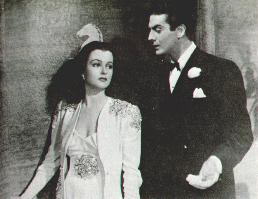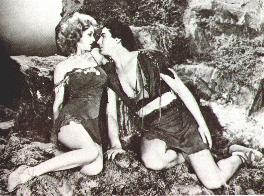

Along with his dramatic debut, he became a full-fledged, tuition-paying acting student. To lower his overhead, he moved from his garage abode to an almost forgotten empty piano crate which had been stashed in a corner of a building on the Pasadena campus. He shared the makeshift accommodations with Duke, a Samoyed dog he had acquired to keep him company, until the duo was discovered by the playhouse authorities. They were asked to vacate. From the boards of the piano crate, Victor fashioned the frame of a tent and covered it with an expanse of theatre-owned canvas. Gilmor Brown gave young Victor permission to pitch the tent in his backyard. To pay his tuition, Victor took on assorted odd jobs: floor scrubbing, dish washing, car greasing and polishing, baby sitting, and dog walking, to name a few. The future movie star once estimated that he survived on an average budget of forty-six cents a day while he was learning to act.
In the spring of 1937, he convinced Gilmor Brown that he ought to be awarded a playhouse scholarship in exchange for the work he did backstage. Gilmor accepted the proposal; Victor stopped paying his tuition in cash. After playing a succession of small parts, he was given his first lead role in 1938 in Autumn Crocus. Among those to see this production was motion picture producer Charles R. Rogers, who was then planning a film on the life of Gus Edwards. Rogers thought that Victor might be suitable for a role in the production. The producer went so far as to inform the trade press that Victor "is a rival to Clark Gable, Robert Taylor and Errol Flynn." Rogers' movie, The Star Maker (Paramount, 1939), starring Bing Crosby, was made, but without Victor. Nor did Mature's hoped-for acting contract with Rogers ever materialize.
If Victor's movie acting ambitions were still just dreams, his romantic life was becoming more concrete. On January 30, 1938, he married another Pasadena Playhouse student, Frances Evans, who went by the professional name of Frances Charles. The couple decided to keep their union a secret, so Victor continued to live in his tent and she remained in the girls' dormitory. The marriage proved a mistake and it was annulled the following year.
Although the Hollywood casting offices never did get around to calling him, Victor acted in more than sixty plays in the Pasadena Theatre, including To Quito and Back, in which he had the starring role. (Some accounts detail that Victor even acted in one of his own dramas, The Incorrigible One, written when he was fifteen.) Carl Schroeder, editor of Screen Guide, did a magazine story on Victor during the run of this play, and the article came to the attention of film producer-director Hal Roach. Roach took more than a casual notice of the virile young man and gave him the featured role of Lefty (tenth billing) in The Housekeeper's Daughter (United Artists, 1939) at one hundred dollars a week. As a lovesick gangster on screen for no more than five minutes, he spoke about twenty-five words of dialog and was required to slap the picture's star, glamorous Joan Bennett. He told J. Marks of Interview Magazine in 1972, "Well, I wasn't too good at it in those days, so I actually hit her pretty hard and knocked her wig off. Bennett was livid. Hal Roach came over with a serious expression on his face and whispered to me: 'Next time hit her a little harder.'" Soon after the film's release in September, 1939, the Hal Roach Studio received some twenty thousand letters from fans inquiring about the obviously well-built novice. Such a response to a new screen personality in a small role was almost unprecedented. (Some Hollywood authorities recalled that back in 1931 Clark Gable had made a similar boxoffice impact by smacking oncamera Barbara Stanwyck in Night Nurse and Norma Shearer in A Free Soul.)
Roach immediately signed Victor to a term contract at $250 a week and set four writers (Mickell Novak, George Baker, Joseph Frickert, and Grover Jones) to work concocting a screenplay that would give Victor Mature much more screen time. Meanwhile, Roach, whose contract stable had lost Stan Laurel and Oliver Hardy but still included John Hubbard, Majorie Woodworth, ZaSu Pitts, Carole Landis, and Patsy Kelly, found the task of taming Mature's image for commercial purposes a formidable task. The actor refused to change his name. However, he did agree to give up his tent life in favor of a furnished house, which he shared with Jules Seltzer, a Roach press agent, and two fan magazine editors, Carl Schroeder and Walt Ramsay. What better way to achieve a fast press build-up than by residing with men whose professional livelihood depended on the revelations of suddenly popular movie actors! Victor's sex appeal and rugged, masculine face were exploited to the hilt, preparing the public for his next screen appearance.
In April, 1940, in One Million B.C. (United Artists), moviegoers saw their new hero wearing animal skins and loin cloths in the focal role of Tumak, the leader of earth's prehistoric "rock people." There could be no doubt but that the 204-pound giant (6' 2 1/2") had muscles from his calves to his neck. A mammoth tosses him from a mountain cliff and he descends safely to the land of the "shell people," where he finds the fairhaired Loana (Carole Landis), looking as if she had just concluded an expensive session in a 1940 beauty parlor. Nevertheless, they fall in love and he escorts her upstairs to his mountaintop lair. The table manners she teaches his bemused tribe are interrupted when a neighboring volcano erupts, stampeding a variety of dangerous animals bearing fourteen-letter names. Throughout his adventures, Tumak is clean-shaven, although all the other cavemen are bearded. Apparently, that is comedy-maker Roach's method of identifying him as the good guy, for surely Tumak's many talents did not include the art of electrolysis. Victor and Miss Landis made a handsome couple, despite their manner of communicating almost exclusively by grunts or groans (speech was not yet realized in One Million B.C.).
The critics poked fun at the Roach-directed film (helmed by both Hal Sr. and Hal Jr.). The New York Times labeled the fantasy outing "a bargain-counter excursion into paleontology," while P.M. described the unique feature as "romance in the early Pleistocene days or what happened to the Capulets and Montagues when men lived in caves and hunted with sharpened sticks." The highlight of the film was supposed to be the special effects of Roy Seabright and Elmer Raguse, but John Baxter, in Science Fiction in the Cinema (Tantury Press, 1970), echoed the most critical opinion of today when he declared, "The ineptly organized battles between lizards are less impressive than Mature's shambling ardour." As for the actor's contribution, the New York Times reasoned that Victor is "perhaps lucky that his first [sic] assignment is in a very immature picture." Archer Winsten of the New York Post assessed that Mature "is good in a brunette primitive way."
For those who questioned the artistic merits of One Million B.C., they had only to wait until October, 1940, to view Roach's next outing, Captain Caution (United Artists). It made the previous "camp" film look much better by comparison. MGM had had great success with it's adaptation of Kenneth Robert's novel, Northwest Passage (1940), but Roach's version of Roberts' Captain Caution was "a singularly unexciting and dawdling screen offering" (William Boehnel, New York World-Telegram); or, as Theodore Strauss (New York Times) noted, "Pistols and dirks do not a drama make."
Victor was again in the lead role. As Dan Marvin, better known as Captain Caution, he is commander of the American merchant vessel Olive Branch during the War of 1812. Aboard the craft are a crew of stalwarts plus Corunna Dorman (Louise Platt), the curly-haired daughter of the late commander (Robert Barrat). She is soon coveted by scheming pirate Slade (Bruce Cabot). The film provided many jobs for the extras registered at Central Casting, most of whom probably not knowing if they were on the good ship or the bad ship. Unfortunately, the audience was also unable to distinguish heroes from villains. However, few viewers really seemed to care, as long as the bare-chested Mature defeated the scoundrel Cabot.


